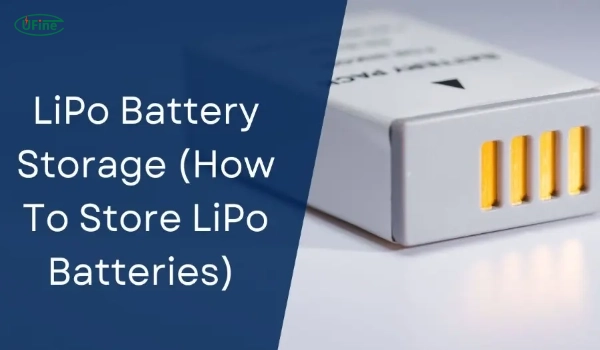Lithium Polymer (LiPo) batteries’ lightweight design, high energy density, and ability to deliver sustained power make them an indispensable technology in today’s fast-paced world. Nevertheless, improper storage conditions can lead to performance degradation, reduced lifespan, or even safety hazards. Understanding the nuances of storing LiPo batteries is crucial for maximizing efficiency and ensuring safety.
Part 1. Influences on LiPo battery storage
1. Temperature
LiPo batteries are sensitive to temperature extremes. High temperatures can accelerate the battery’s internal chemical reactions, leading to quicker degradation and reducing its overall capacity. Conversely, storing them in icy environments might diminish their performance temporarily. Ideal storage temperatures generally range between 15°C to 25°C (59°F to 77°F).
2. Humidity
Moisture is detrimental to LiPo batteries as it can cause corrosion or damage to their internal components. Storing batteries in dry environments, free from moisture, helps preserve their integrity and prevents the risk of short circuits or malfunctions.
3. Voltage and Charge
Ensuring LiPo batteries are stored at a suitable charge level is crucial. Long-term storage at full charge or depleted levels can harm the battery’s overall health. Ideally, keeping LiPo batteries at approximately 50% charge helps maintain their stability and longevity.
4. Keep Away from Fire
LiPo batteries are highly flammable. Storing them in areas prone to fire hazards or near sources of high heat increases the risk of combustion. Always keep LiPo batteries away from flammable materials, open flames, or extreme heat sources.
5. Duration of storage
Extended storage periods without using or maintaining LiPo batteries can also impact their performance. Regularly cycling batteries through usage and ensuring proper storage conditions can mitigate potential degradation over time.
Part 2. LiPo battery storage tips for home
1. Suitable Containers: Storing LiPo batteries in appropriate containers or fireproof bags is essential. These specialized containers or bags are designed to contain potential fire hazards if a battery malfunctions, providing an added layer of protection.
2. Ventilation: Adequate ventilation in the storage area helps disperse any gases that might build up due to battery degradation or malfunction. Proper airflow reduces the risk of gas accumulation, minimizing the potential hazards associated with LiPo batteries.
3. Isolation: Isolating LiPo batteries from flammable materials or other sensitive electronic components is crucial. Keeping them separate prevents potential damage or fire hazards in case of malfunction.
4. Labeling: Labeling storage containers with information regarding the battery type, charge level, and any specific storage instructions can be immensely helpful. This labeling ensures easy identification and compliance with the recommended storage conditions.
Part 3. LiPo battery storage tips for travel
Here are considerations for safely storing LiPo (Lithium Polymer) batteries while traveling, especially in vehicles and aircraft:
Vehicles
- Secure Mounting: Securely mount the batteries to prevent movement or potential damage during vehicle motion. Using battery straps or closed compartments helps in preventing accidental shifting or impacts.
- Temperature Regulation: Avoid exposing batteries to extreme temperatures. Ensure they are stored in a well-ventilated area within the vehicle, away from direct sunlight or heat sources like engines, which could cause overheating.
- Protection from Damage: Shield batteries from possible damage due to collisions or impacts. Placing them within a protective container or padded enclosure helps mitigate potential damage.
Aircraft
- Pre-flight Checks: Ensure batteries are adequately charged but not at maximum capacity. Confirm airlines’ specific regulations on the quantity and capacity of batteries allowed on board.
- Safe Packaging: Transport LiPo batteries in carry-on baggage whenever possible. Store them in fireproof and impact-resistant containers, like LiPo-safe bags or fire-resistant pouches, to mitigate risks of fire or damage.
- Regulations Compliance: Comply with airline guidelines and regulations regarding the transportation of lithium batteries. Airlines might have specific restrictions or requirements for carrying these batteries on flights.
Part 4. Long-term storage LiPo battery
Long-term storage of LiPo (Lithium Polymer) batteries requires specific measures to maintain their health and performance over extended periods. Here are essential considerations for effectively storing LiPo batteries:
1. Charge Level
For prolonged storage, it’s recommended to partially charge the batteries to around 50-60% of their capacity. This charge level is considered optimal for preserving battery health during long periods of inactivity.
2. Storage Temperature
LiPo batteries should be stored in a cool, dry place, away from direct sunlight or heat sources. Extreme temperatures can accelerate battery degradation and compromise performance. Ideal storage temperatures typically range between 15°C to 25°C (59°F to 77°F).
4. Monitoring
Regularly monitor the battery charge level during storage. If batteries are stored for months, check their charge status every few months and recharge if they’ve significantly discharged to prevent deep discharge.
5. Voltage Maintenance
Ensure that batteries are not stored fully charged or depleted for extended periods. Both overcharging and deep discharging can adversely affect the overall health and longevity of LiPo batteries.
6. LiPo Safe Bag
Use appropriate storage bags or fireproof containers designed explicitly for LiPo batteries. These containers help contain any potential fires that may occur due to battery malfunctions, providing an added layer of safety.
5부. 자주 묻는 질문
-
What is the best thing to store LiPo batteries in?
Storing LiPo batteries in a fireproof LiPo safety bag or a metal container with a fireproof lid is recommended to mitigate potential hazards. -
Should you store LiPo batteries fully charged?
It’s best to store LiPo batteries at around 50% to maintain their health during storage; fully charged can lead to increased degradation over time. -
How long do LiPo batteries last in storage mode?
LiPo batteries can typically retain their charge for several months when stored in a proper storage mode, around 3.8 to 3.85 volts per cell. The exact duration can vary based on the quality of the battery and storage conditions. -
Is it safe to store LiPo batteries?
Storing LiPo batteries can be safe if done correctly. Following proper storage guidelines, such as keeping them at moderate charge levels in fireproof containers and away from flammable materials, significantly reduces potential risks. -
Do LiPo batteries catch fire in storage?
LiPo batteries can significantly pose a fire hazard if damaged, punctured, or stored improperly. Following safety protocols during storage minimizes the risk of fire incidents. However, a damaged or mishandled LiPo battery could catch fire even during storage in rare cases or under extreme conditions.
관련 태그:
더 많은 기사

The Ultimate Guide to Remove Battery Corrosion
Learn how to remove battery corrosion, prevent future damage, and maintain battery health with our detailed guide.
How to Properly Discard Batteries and Protect the Environment?
Batteries power daily essentials but improper disposal poses risks. Learn to discard them responsibly for sustainable living and environmental protection.
Battery Manufacturing Process: A Comprehensive Guide
The battery manufacturing process creates reliable energy storage units from raw materials, covering material selection, assembly, and testing.
5 Creative Ways to Battery Organiser: Say Goodbye to Clutter
Tired of searching for the right battery? Discover five creative ways to organize batteries and keep your home clutter-free with this efficient storage guide.
Everything You Need to Know About 3.7v Battery
Discover the ins and outs of 3.7V batteries, including types, capacities, and applications. Learn how to choose the best one for your needs.




